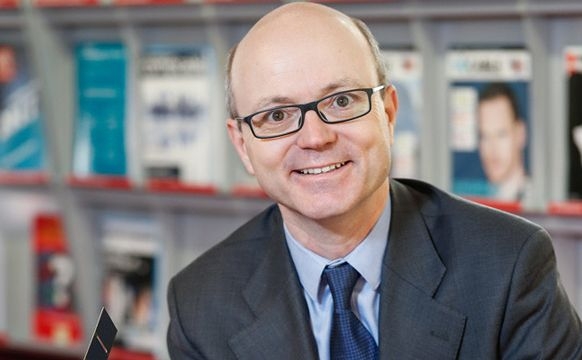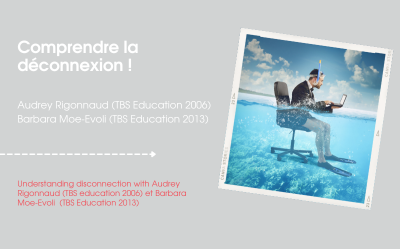News

Christophe Bénaroya (TBS 1993): Our role is to train executives and leaders in a sector that is undergoing big changes
Christophe Benaroya, TBS Aerospace MBA Programme Director
''This November, Toulouse Business School (TBS) will celebrate 20 years of offering educational programmes in the field of aeronautics. Its world-class Aerospace MBA has seen significant changes this year. Christophe Benaroya, Director of the Aerospace MBA programme, discusses the new developments in the training of the next leaders who will accompany the growth and expansion of the aeronautical and space sector. Interview.
Why change the programme?
The global aeronautics and space sector has changed much in 20 years, and the acceleration of long cycles in industry calls upon us to act. Our role is to provide support, not only this movement, but also to former executives and leaders of a sector that is changing rapidly, and who are capable of working in an environment that is much more uncertain. We have a real expertise in this sector, and we haven’t addressed the aeronautics sector over the last few years.
Of course we have kept the programme’s contents up-to-date over the years, but our pedagogy methods have remained the same. The idea is to expand the programme so that it will be in a better position to take into account, not only the developments in the sector, but also those that will emerge in the coming years which we are unknown to us today. For example, global manufacturers are now becoming very concerned about environmental commitments. It is becoming more serious, no longer just “green washing”, and therefore must be incorporated into our programme.
What’s new in the Aerospace MBA?
The reorganisation of the Aerospace MBA programme takes three approaches. The first approach concerns the increase of exchanges between participants. The "full time" (long haul) and "part time" (hub) courses have been hybridized to create more sharing, and more richness through the experiences of people of different nationalities in order to promote the practices in use in today’s aeronautics and space sector. These exchanges between the participants, “peer-learning”, are promoted in each of the three approaches utilised, from the academic fundamentals of management, to “specialised tracks” and “process workshops”.
The second, essential approach is to address the absolute need to strengthen participants’ soft skills. This was already on the agenda, but we strengthened it in the light of recent developments in the sector, such as digitisation and the acceleration of the globalisation of trade. This leads us to strengthen intercultural understanding. We have multicultural projects related to aeronautics. In the Applied Business Workshop we work with companies that bring their business development issues. For example, there may be questions about the penetration of a certain geographic market, and then the strategy will be seen from the various participants. It’s very applicative, a real “commando-style” mission for a company. But there are also many other longer-term projects.
Finally, the third and final approach concerns integrating the latest developments in the aeronautics and space sector. This is at the heart of changes we are making to our programme. The idea is to incorporate subjects that were previously addressed at the margins of the curriculum in order to meet the constraints of course hours. We found a way around this with the implementation of eight weeks of “Broadening our Vision” courses. This involves addressing topics such as the Iot, blockchain, more detailed aspects on leasing (for example on engines), and obviously industry 4.0. We also address the circular economy and societal commitments, and we can see that there is a growing need for teaching on geopolitical issues.
How can we develop the soft skills of our participants?
For the leadership and soft skills aspects of our programme, last year TBS launched a new tool dubbed the “KUBE”, which is a high-tech learning lab which allows our students to express themselves freely in public, without a podium, and with several cameras filming from different angles. This allows us to promote much more natural presentations and in the latest practices of oral expression, and our participants can benefit from feedback within their company.
As to soft skills, and the multicultural dimension, we can provide support to participants who need assistance accessing the labour market in Europe and France, as the codes can be profoundly different from one country to another. We are also a member of the USAIRE association, and have an agreement that allows our students to participate in its conferences and produce reports by working transversally with other programmes.
There is nothing like immersion in the aerospace ecosystem. That is something we will be fostering even more in the future. Moreover, the hybridization of our programme allows the two types of profiles, the "part time" (hub) and the "full time" (long-haul), to follow the same courses for the first two blocks of training - for the fundamentals and the applicative part - and each of the two profiles now includes an experience abroad element (Montreal and Casablanca).
Digitalisation is growing significantly in the sector. Does it have an impact on the training of managers?
Digitalisation obviously affects the engineers first and foremost. But on the managerial side, and in the face of this real industrial revolution, it’s the people who are becoming even more valuable, because - beyond data analytics - business is conducted around meetings. Negotiations don’t take place remotely, and human beings are finally becoming even more valuable, since they are becoming rarer. In fact, we are trying to ensure that our programmes can look back with hindsight and take a step back to promote discussions that take place outside of emergencies.
What about TBS’s other aeronautical programmes?
As for our other programmes, the Aerospace Management Master 2 specialisation, the Aviation Management in Bachelor given in partnership with the ENAC, and ENAC-TBS’s Air Transport Management Specialised Master, we will also take a look at what we are doing on the Aerospace MBA and review how they work, and how we can enrich them. For the next 20 years, there will be a domino effect. The transformation of the Aerospace MBA is only a first step. We have just set up a cluster called “Aerospace & Mobility”, whose aim is to provide an even more global view of all our aeronautical and space activities, both in research and teaching, as well as in the context of our work in providing support to companies. The goal is to have a more comprehensive offer to address the strategic and managerial issues of aerospace organisations.''
Source:















No comment
Log in to post comment. Log in.